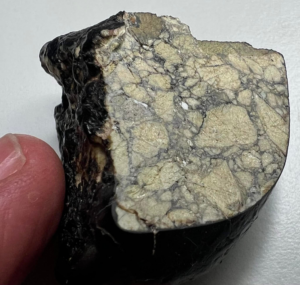OU News
News from The Open University
- Home
- Timing Is Everything: A New Take on Planet Formation
Timing Is Everything: A New Take on Planet Formation
Posted on • Science, maths, computing and technology

A meteoritic fragment from a long-lost planet in the outer Solar System has been discovered — and it’s rewriting the story of when planets form.
Dr Ben Rider-Stokes, a researcher at The Open University (OU), has identified a unique meteorite that challenges the long-standing view that planets near the Sun formed earlier than those farther out. His findings, published today in Nature Communications Earth and Environment, suggest that inner and outer planets formed at the same time — a major shift in our understanding of Solar System evolution.
“We thought that the icy conditions in the outer Solar System delayed the formation of rocky planets,” said Dr Rider-Stokes, lead author of the study. “But our findings show they were forming just as fast as those closer to the Sun.”

An asteroid sample with large clasts of olivine. Credit: Ben Rider-Stokes
The breakthrough came from analysing a rare meteorite known as Northwest Africa (NWA) 12264. This sample — the first ever linked to a planetary mantle from the outer Solar System — recorded an astonishing age of 4.564 billion years. That makes it one of the oldest known magmatic rocks from any part of the Solar System and places it on par with ancient inner Solar System basalts.
This means rocky planets beyond Jupiter began forming much earlier than previously thought — forcing scientists to rethink long-held models of planet formation not only in our own system, but across the galaxy.
“This study highlights the value of rare meteorites in helping us understand planetary origins,” Rider-Stokes added. “It’s incredibly exciting to challenge the existing models of how planets — and ultimately life — begin.”
Dr Rider-Stokes will present the findings at the International Meteoritical Society conference in Australia next week.
The research was funded by the Science and Technology Facilities Council (STFC). The full paper, titled Rapid protoplanet formation in the outer Solar System recorded in a dunite from the carbonaceous chondrite reservoir, is available in Nature Communications Earth and Environment.